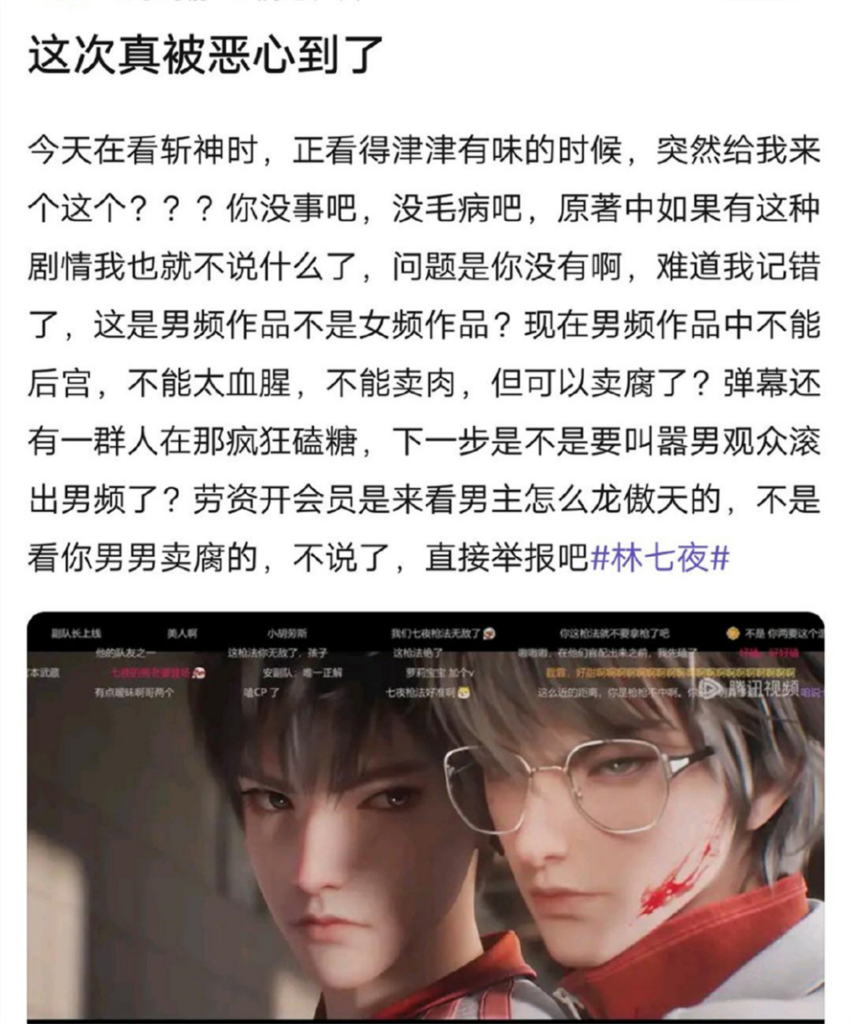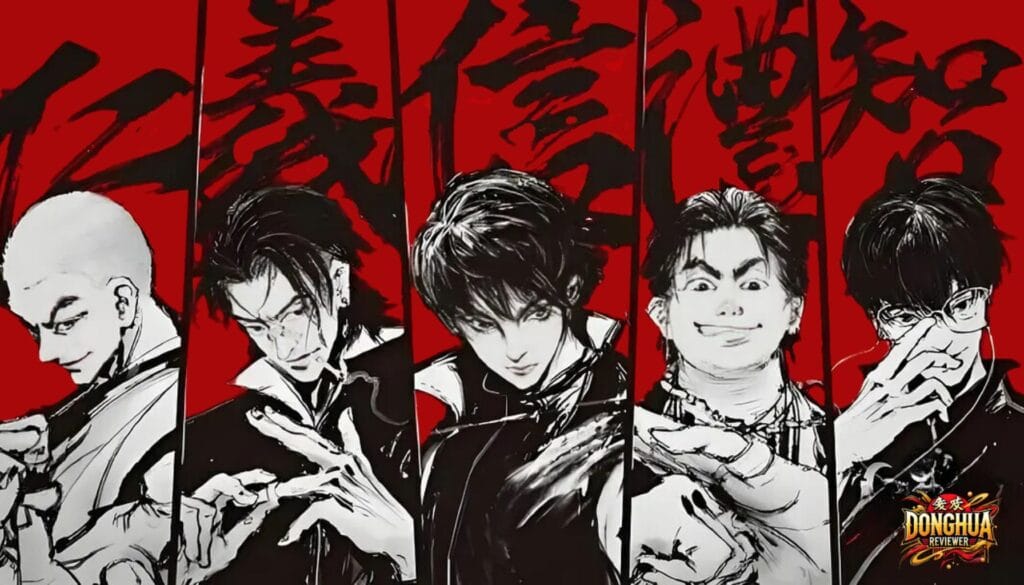“Slay The Gods (斩神之凡尘神域)” has quickly become one of the most discussed donghua in recent times, capturing the attention of viewers with its intense action, intricate characters, and deeply woven storyline. Based on a popular novel, the series has built a loyal fanbase eager for each new episode. However, alongside its success, Slay The Gods has also sparked significant controversy, especially following the release of its fifth episode. This article will briefly address the controversy before diving deeper into the broader themes, characters—especially Hongying—and the ongoing evolution of this compelling series.”

Table of contents
- The Controversy of Episode 5: Forced Narratives and Fan Backlash
- Shifting Focus: Exploring the Deeper Themes and Characters
- Hongying: The Captivating Warrior
- The New Recruits Training Camp: A Challenge for Heroes
- Key Characters from the New Recruits Training Camp
- The Asylum: A Microcosm of Divine Conflict
- Key Characters: Gods Battling Madness
- Lin Qiye: The Burden of Leadership
- The Evolution of Slay The Gods : Balancing Audience Expectations
- Looking Ahead: The Future of Slay The Gods and Its Legacy
The Controversy of Episode 5: Forced Narratives and Fan Backlash


Episode 5 of Slay The Gods sparked a heated debate within the fan community. The episode introduced a scene of unexpected intimacy between the characters Lin Qiye and An Qingyu, leading to accusations of “腐” (fujoshi) baiting—where creators add suggestive content between male characters to appeal to fans of male-male romantic pairings. Absent from the original novel, some saw this scene as a forced narrative that strayed from the series’ core themes. The backlash from fans, especially those who felt the donghua was moving away from its male-oriented roots, was swift and vocal. While this controversy is noteworthy, it represents only a small part of Slay The Gods’s offerings.
Shifting Focus: Exploring the Deeper Themes and Characters
Beyond the controversy, Slay The Gods is rich with intricate storytelling, mythological depth, and a fascinating exploration of madness and power. The series centers on Lin Qiye, a young man who becomes the director of a mysterious mental asylum where gods from various mythologies are treated for their ailments. This asylum, unlike any ordinary institution, serves as both a sanctuary and a battleground, where divine beings wrestle with their madness while the fate of entire worlds hangs in the balance.
Hongying: The Captivating Warrior

Among the many characters in Slay The Gods, Hongying stands out as one of the most compelling and visually striking. As a key member of the protagonist group, Hongying is not only a fierce warrior but also a character with a deep and complex backstory. Her presence in the series adds both strength and allure, making her a fan favorite.
In Episode 6, Hongying’s formidable skills are on full display, particularly during a tense moment when she assists Lin Qiye. Her determination and bravery shine as she navigates dangerous situations with grace and precision. One of the most memorable aspects of Hongying’s character is her striking appearance—her tall, elegant figure, crimson hair, and stunningly white legs make her an iconic figure in the series. Fans often praise her for her strong yet feminine presence, which stands out in a show filled with powerful male characters.
However, Hongying is more than just a warrior. Her character is deeply connected to the overarching narrative of Slay The Gods, and her loyalty to Lin Qiye is a central theme. Despite the chaos that surrounds them, Hongying remains a steadfast and reliable ally, providing both strength and emotional support to the team. Her interactions with other characters, particularly Lin Qiye, reveal layers of toughness and vulnerability that resonate with viewers.
The New Recruits Training Camp: A Challenge for Heroes
The New Recruits Training Camp is a critical setting in Slay The Gods. It is here that many of the series’ key characters, including Lin Qiye, Bai Li Pangpang, Molly, Cao Yuan, and Shen Qingzhu, undergo rigorous training to become elite warriors. The camp is not just a place for physical training; it is a crucible where characters are tested mentally, emotionally, and spiritually. This intense environment pushes each recruit to their limits, forcing them to confront their fears, insecurities, and the darkness within themselves.
Key Characters from the New Recruits Training Camp
Baili Pangpang (Bai Li Fatty/Bai Li Tuming)

)
- Human Identity: Heir to the Bai Li Group, Former Member of 010 Squad in Guangzhou, Nightfall Squad Member
- True Identity: Lingbao Tianzun of Great Xia
- Alias: The Foolish Son of a Landlord
- Realm: Ascender
- Forbidden Domain: [Wanwu Jiaoxie (Disarmament of All Things)]
- Japanese Wanted Level: [Extremely Wicked Criminal]
- Love Interest: Molly
Baili Pangpang, often affectionately known as Bai Li Fatty, is one of the most intriguing characters in Slay The Gods. Born into the powerful Bai Li Group, he was initially seen as a pawn in his family’s larger schemes. However, his true identity as Lingbao Tianzun, a revered deity, gradually comes to light. His journey is marked by betrayal and resurrection—having been killed by someone he trusted, only to be revived by a divine artifact. Bai Li Tuming’s story is one of transformation, evolving from a seemingly naive and foolish character to a powerful and strategic figure in the Nightfall Squad.
Molly
- Identity: Member of 017 Squad in Suzhou City
- Weapon: Katana
- Forbidden Domain: [Wanxiang Pindong (All Phenomena in Motion)]
Molly is another key character who graduates from the New Recruits Training Camp alongside Lin Qiye. With her striking pink hair and determined personality, Molly is a formidable warrior. Her weapon of choice, a katana, reflects her precise and deadly combat style. Despite her beauty and grace, Molly is deeply committed to her comrades. Her relationship with Bai Li Tuming adds complexity to her character, as their interactions reveal a softer side to both warriors.
Cao Yuan

- Identity: Former Member of 007 Squad in Huaihai City, Nightfall Squad Member
- Realm: Ascender
- Forbidden Item: [Condensing Spirit Pearl]
- Forbidden Domain: [Heiwang Zhanmie (Black King’s Annihilation)]
- Japanese Wanted Level: [Extremely Wicked Criminal]
Cao Yuan’s story is one of tragedy and redemption. As a child, he witnessed the massacre of his entire family, leaving him deeply scarred. Branded as a harbinger of disaster, Cao Yuan grew up isolated and tormented by guilt. His forbidden domain, Heiwang Zhanmie, grants him immense power, but at a great cost—using it causes him to lose control, attacking friend and foe alike. Despite his dark past, Cao Yuan’s loyalty to Lin Qiye and the Nightfall Squad drives him to seek atonement for his sins, even as he battles the darkness within.
Shen Qingzhu

- Identity: Former Member of 006 Squad in Shangjing City, Former 15th and 10th Seat of the Believers, Nightfall Squad Member, Leader of the Black Kill Group
- Title: Silent Angel (Six-Winged Angel)
- Realm: Ascender
- Appearance: A man wearing a flowing cloud cloak, with rings on his right hand, and a mysterious white fox mask on his face.
- Origin: Hell’s Origin
- Forbidden Domain: [Qimin]
- Weapons: [Broken Soul Sword], [Yuandao Jade]
- Japanese Wanted Level: [Extremely Wicked Criminal]
Shen Qingzhu is a character shrouded in mystery and intrigue. Once a member of the Believers, an enigmatic and dangerous group, Shen Qingzhu was known for his ruthless efficiency and deadly skill. However, after a series of harrowing events, including a near-death experience, he switches sides and becomes a key member of the Nightfall Squad. His rise to leader of the Black Kill Group marks his evolution from a solitary assassin to a leader of warriors. Shen Qingzhu’s story is one of redemption as he seeks to atone for his past by fighting for a greater cause.
The Asylum: A Microcosm of Divine Conflict
The asylum in Slay The Gods is not just a physical setting; it symbolizes the broader conflicts that define the series. Originally a piece of the Ascension World—a higher dimension accidentally brought into the mortal realm—the asylum was transformed by the entity known as the Three Nine Octave Domain. The first director, Commemoration, was tasked with gathering the souls of six gods, each suffering from unique mental disorders. After Commemoration stepped down, Lin Qiye took on the immense responsibility of managing these powerful and often volatile entities.
The asylum itself is a key element of the story, representing themes of power, control, and the thin line between sanity and madness. The interactions within the asylum reflect the larger battles in the divine world, making it a microcosm of the ongoing struggle between order and chaos.
Key Characters: Gods Battling Madness

The characters in Slay The Gods are a major draw for audiences, each bringing unique struggles and complexities to the story. These gods, each from different mythological backgrounds, are not only powerful beings but also deeply scarred by their pasts, making their stories as much about internal conflict as external battles.
- Nyx (The First Patient): The Greek goddess of the night, Nyx, suffers from a delusional disorder where she perceives everything she sees as her child. Her story is a powerful exploration of the struggle for control over one’s mind and the battle between internal and external power.
- Merlin (The Second Patient): The legendary wizard from English mythology, Merlin, suffers from severe schizophrenia. His quest for truth and the subsequent mental fragmentation highlight the dangers of seeking knowledge beyond human comprehension.
- Bragi/Idunn (The Third Patient): Bragi, the Norse god of poetry and music, shares his body with Idunn, the goddess of youth. Their intertwined existence symbolizes the complex nature of love and identity among the divine.
- Sun Wukong (The Fourth Patient): The Monkey King from Chinese mythology, Sun Wukong, deals with severe depression following the loss of his disciple. His journey is a poignant exploration of grief, loss, and the path to recovery.
- Gilgamesh (The Fifth Patient): The Sumerian demigod king, Gilgamesh, faces his arrogance and pride, which have led to his downfall in the past. His story reflects the dangers of hubris and the importance of humility.
- Nyarlathotep (The Sixth Patient): A chaos god from the Cthulhu Mythos, Nyarlathotep, disguised as the creator god Yelande, manipulates and deceives others to gain control of the asylum. His character embodies the ultimate chaos within the universe and the ongoing battle between order and madness.
Lin Qiye: The Burden of Leadership
As the director of the asylum, Lin Qiye plays a central role in managing these powerful yet troubled beings. His journey from an ordinary man to the leader of an asylum for gods highlights his growth as a character and the immense challenges he faces. Unlike his predecessor, Commemoration, who acted as a caretaker, Lin Qiye must actively engage with the gods, often risking his own life to maintain order within the asylum.
Lin Qiye’s ability to relate to the gods’ struggles—whether it’s Nyx’s desire for revenge, Merlin’s quest for truth, or Sun Wukong’s battle with depression—makes him uniquely suited to his role. However, his journey is far from over, as the threats both within and outside the asylum continue to grow, forcing him to constantly balance power and madness.
The Evolution of Slay The Gods: Balancing Audience Expectations
As Slay The Gods progresses, it faces the challenge of balancing the expectations of a diverse audience. The controversy surrounding Episode 5 underscores the delicate balance creators must strike between staying true to the source material and exploring new creative directions. While the inclusion of scenes that appeal to different demographics can broaden the series’ appeal, it also risks alienating segments of the original fanbase.
The evolution of Slay The Gods raises important questions about the direction of the donghua and how it can continue to engage its audience without losing its core identity. The series began as a male-oriented story focused on action, adventure, and camaraderie among its characters. As it evolves, the challenge is to ensure that any new elements feel natural and integrated into the story, rather than forced or out of place.
Looking Ahead: The Future of Slay The Gods and Its Legacy
The journey of Slay The Gods is far from over, and its future will be shaped by the decisions made by its creators in the episodes to come. The controversy surrounding Episode 5 serves as a reminder of the challenges that come with adapting a popular work and the importance of balancing fan expectations with creative growth.
As Slay The Gods continues to unfold, it will be fascinating to see how the series evolves and how it navigates the complex web of audience expectations, creative decisions, and narrative integrity. Whether you’re a long-time fan of the novel or a new viewer discovering the donghua for the first time, there’s no doubt that Slay The Gods will continue to be a topic of discussion and debate for years to come.
What are your thoughts on the evolution of Slay The Gods? Do you think the series stays true to its roots, or is it straying too far from its original intent? How do you think the creators should balance the diverse expectations of the fanbase moving forward? Share your thoughts and join the discussion—this donghua has much more to offer, and its future will be shaped by the conversations it inspires.
.





